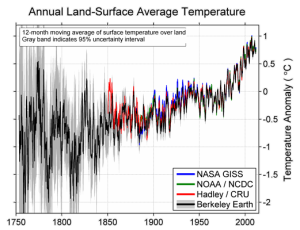FAQ
Won’t a price on carbon hurt our economy?
This is an excellent question, and one we need to be very careful about. We must retain a strong economy for all the obvious reasons — jobs, investment, standard of living, health — and also to fund the research and innovation we’ll need to turn the situation of climate change around. In fact, immediate, modest action will positively affect the economy, rather than coping with increasingly severe damages which would be a significant drag on the economy. The results thus far in British Columbia with it’s carbon tax in place since 2009, has shown their GDP is essentially the same as the rest of Canada, not less. Also, California, when in the early 70s pushed to reduce per capita electricity use, did see electricity use fall, but the GDP continued upward. Per capita electricity use in California has remained much lower than the rest of the U.S. The balance needed is to add to the economy with jobs in alternatives and other improvements at the same time we’re changing out of fossil fuels.
Doesn’t “Climategate” show that there is manipulation of the data?
The controversy over emails stolen from the University of East Anglia’s Climatic Research Unit in 2009 caused some to worry that climate data and research have been compromised. Most accounts demonstrate that the quotes that were discussed on talk shows were largely (or totally) taken out of context and not reliable. The Climategate scandal has been subject to several separate investigations, all of which exonerated all scientists involved from any wrongdoing. Further, the few scientists involved could not possibly manufacture a global scheme to undercut the science of thousands of others.
Perhaps the most important result of Climategate was that the scientific community took an even closer look at the temperature data and analyses. One scientist, proclaimed climate skeptic and Berkeley Physics Professor Richard A. Muller, decided that he would launch the Berkeley Earth Surface Temperature (BEST) project to find out for himself what temperature data and adjustments could be trusted. He and Elizabeth Muller assembled a team of scientists with the goal to address criticisms raised by climate skeptics about how existing records of the Earth’s average surface temperature have been compiled. As a result, in a July 2012 press release BEST stated,
“According to a new Berkeley Earth study released today, the average temperature of the Earth’s land has risen by 1.5°C over the past 250 years. The good match between the new temperature record and historical carbon dioxide records suggests that the most straightforward explanation for this warming is human greenhouse gas emissions.”
BEST’s current temperature plot on the right shows warming generally from about 1900, prior to which there was significant “noise”, and clearly from 1970.  It further shows that other principal compilations of temperature data coincide.
It further shows that other principal compilations of temperature data coincide.
Click on figure to enlarge.
For more information, the UCS reviews the entire event well. In fact, the data supporting human caused climate change are exceptionally strong
Hasn’t climate change slowed or stopped?
Temperatures have not risen every year in succession, and have been moving up only slightly since 1998, but that doesn’t mean climate change has slowed. Weather and climate are different. One needs to look at the overall trend to understand climate. Like seven high waves in a row doesn’t necessarily mean the tide is coming in, short trends in temperature do not indicate climate. At a long — climate — scale, the temperature continues to creep up.
The winters are colder, not warmer! What’s up with that?
If you live in the northeastern and midwestern U.S. you might agree. But if you live in California you definitely wouldn’t. Even long term, although many areas will eventually be warmer, depending on local conditions, some areas can be cooler. The effect of climate on global weather is still poorly understood. See further discussion here.
What’s the rush? It will take a long time to change, won’t it?
It depends on what we mean by a “long time”. Sea level rise is predicted to go up probably on the order of one meter, and possibly two by 2100. One meter of sea level rise will affect 100 million people. That’s only 85 years, and of course the change will begin to accelerate sooner. The other risks will accelerate as well. Also, the sooner we start, the less threat to our economy. Those are all good reasons to push forward.
We’re only talking about parts per MILLION difference in CO2. That can’t matter, can it?
It sounds like a very small amount and it is, but the effect is strong. The amount of heat generated by the CO2 and other greenhouse gases (GHG) in the atmosphere can be calculated using understanding from physics and chemistry. And surprisingly, the so-called high Global Warming Potential gases, cluorofluorcarbons (CFCs), can be thousands of times more powerful at warming than carbon dioxide; sulfur hexafluoride is 25,000 times more powerful . Learn more about the differences among greenhouse gases here.
Additional FAQs
For additional FAQs you may visit: NASA, NOAA, MIT, and concerning carbon pricing, see carbontax.org, Resources for the Future, and carbon-price. Or if you wish to have a question answered, ask us in a message.
